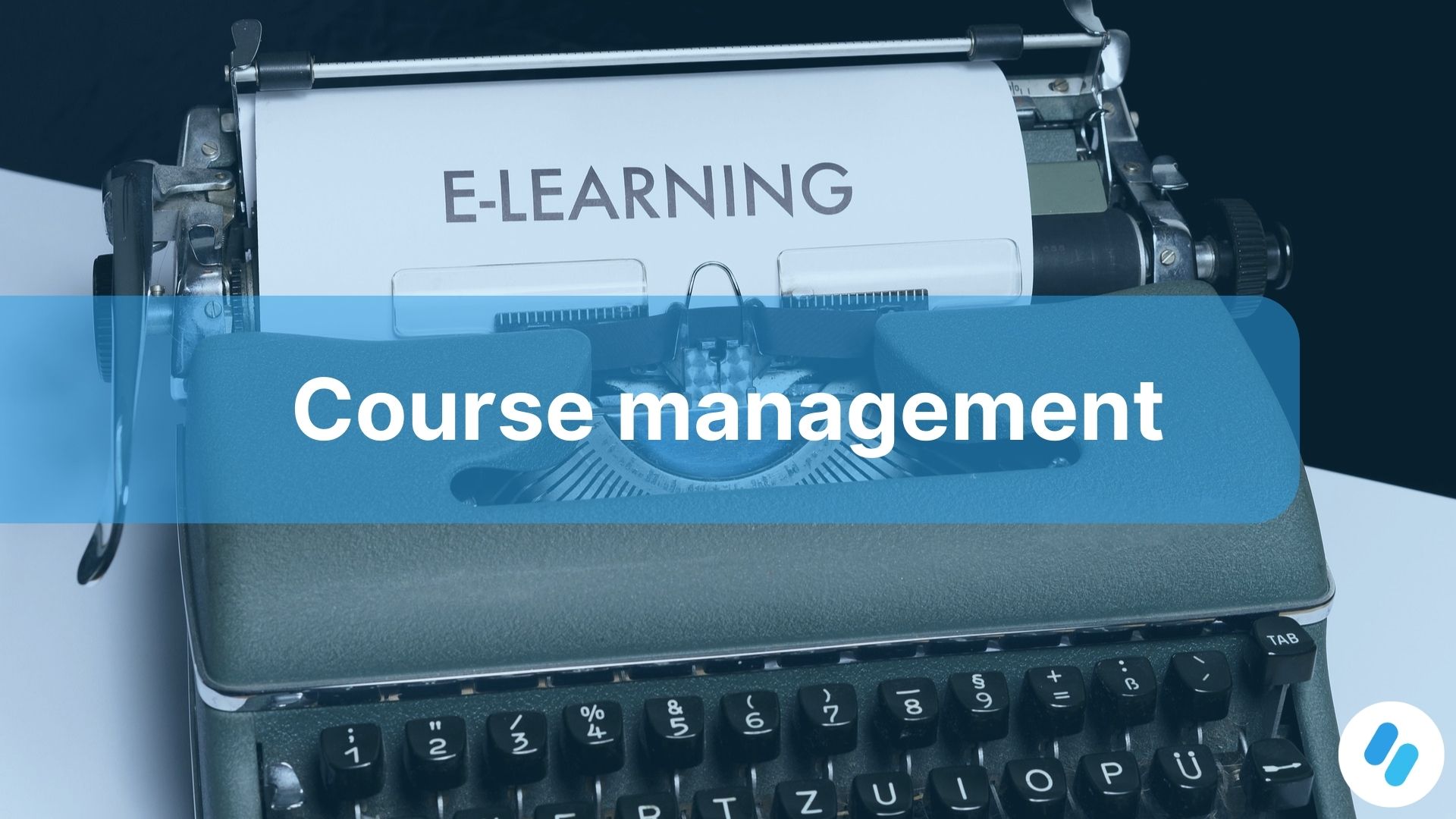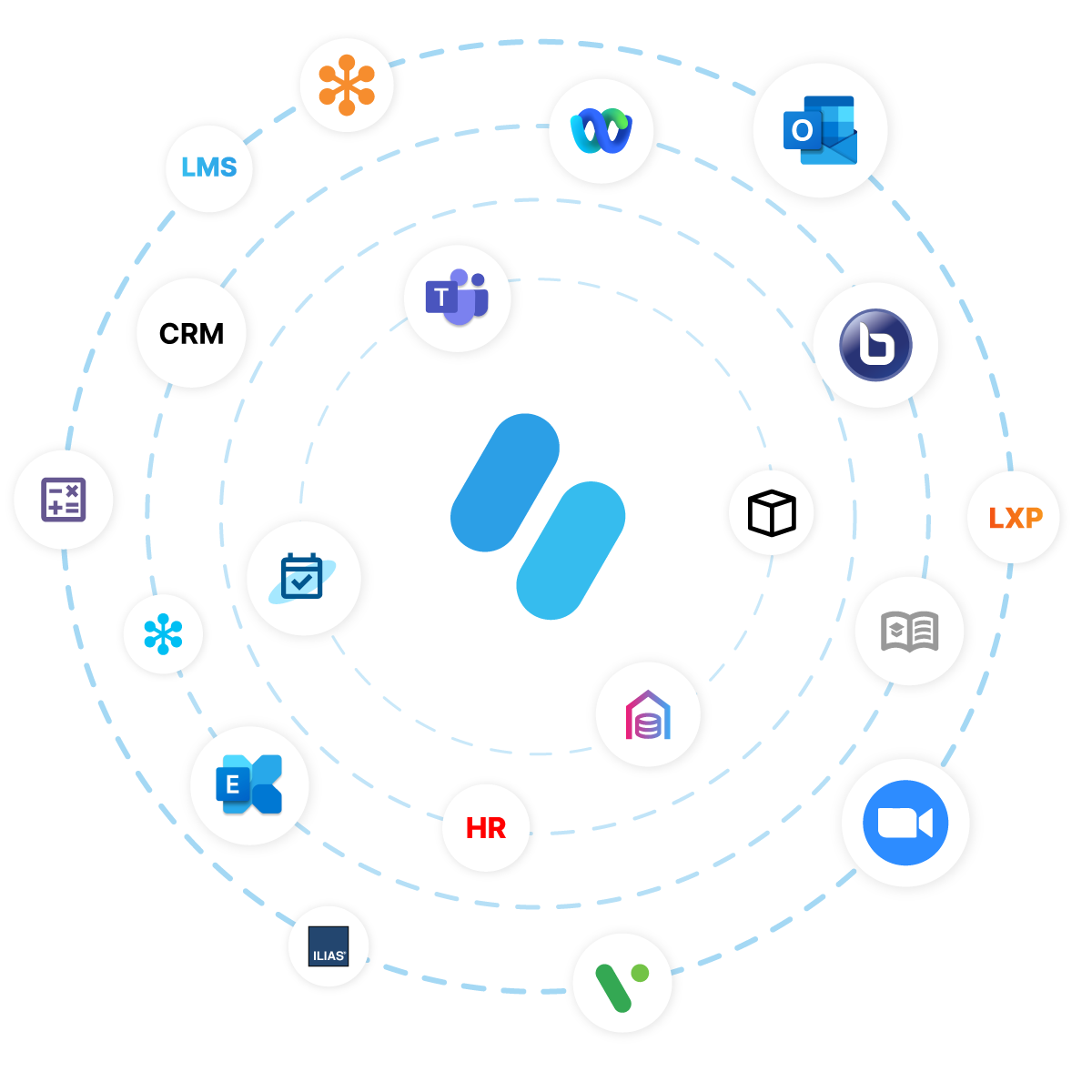Looking for efficient resource management? In this blog article, you will gain insights into the...
Guidelines for successful seminar management
Seminar management is a crucial aspect of the educational and corporate world that deals with the planning, organization and implementation of educational events. It encompasses a wide range of tasks, from the selection of topics and speakers to logistics and participant support. At a time when lifelong learning is becoming increasingly important, seminar management plays a central role in providing high-quality learning opportunities.
.png?width=1920&height=1080&name=Design%20ohne%20Titel(1).png)
The importance of effective seminar management in today's educational landscape
- Adaptation to diverse learning needs: In a rapidly changing world, educational programs need to be flexible and diverse. Effective seminar management makes it possible to offer customized learning programs that are tailored to the specific needs and interests of the participants.
- Utilizing technological advances: The integration of technology into seminar management, such as online learning platforms and interactive tools, extends the reach and accessibility of educational offerings.This enables learners worldwide to participate in seminars regardless of their location.
- Increasing efficiency and effectiveness: Through effective management, resources can be used optimally and learning success can be maximized.This includes the careful planning of schedules, resources and content to ensure that the seminars offer the greatest possible benefit for the participants.
- Promoting lifelong learning: In a world where knowledge and skills are constantly evolving, lifelong learning is essential. Well-organized seminars help to promote a culture of continuous learning and personal development.
Basics of seminar management
Definition and objectives of seminar management
Seminar management refers to the process of planning, organizing and conducting educational events such as workshops, conferences and seminars with or within companies. It is a multidisciplinary approach that aims to create and manage effective learning environments. The main objectives of seminar management include:
- Knowledge transfer: Ensuring that participants acquire the necessary information and skills.
- Participant management: Promoting an interactive and inclusive learning experience.
- Effective use of resources: Optimal use of time, budget and other resources.
- Performance measurement: Evaluation of the effectiveness of the seminar through feedback and key performance indicators.
Important aspects of seminar planning and organization
Planning and organizing seminars requires careful thought and strategy. Key aspects include:
- Selection of topics and content
- Definition of relevant and current topics
- Development of a structured and comprehensive curriculum
- Digital documentation and preparation of the topics
- Trainer selection
- Selection of qualified and experienced specialists
- Ensure that the instructors can effectively convey the learning objectives
- Logistics and venue:
- Selection of a suitable location that is easily accessible and suitable for the event
- Planning the necessary logistical aspects such as accommodation, catering and transportation
or - Hold seminars digitally
- Participant management
- Development of an efficient login and registration process
- Consideration of the needs and expectations of the participants
- Budgeting and financial management:
- Creation of a realistic budget
- Efficient management of finances to ensure cost-effective implementation
- Free use through in-house training platforms
- Feedback and follow-up:
- Collection of feedback for continuous improvement
- Analyzing the results and measuring the success of the seminar
By taking these aspects into account, seminar management can ensure that educational events are not only informative and enriching, but also efficient and targeted.
If, for example, you would like to organize the seminar management internally, it is always advisable to use a learning management system that completely automates processes and does not require any external structures. For more information on the topic of LMS, you can get an overview here.
Requirements for effective seminar management software
When selecting seminar management software, there are certain key factors to consider to ensure that it is effective and adaptable to the needs of the organization. Key requirements include:
- Adaptability
- Flexible design options: The software should be customizable to meet specific requirements of different types of seminars. This includes customization in terms of design, functionality and user experience.
- User-friendly reporting: It should be able to generate customized reports that provide specific data and analysis for event planning and evaluation.
- Einfache Registrierung: The ability to personalize registration forms is crucial to collecting relevant information from participants.
- Scalability
- Support for different event sizes: The software must be able to efficiently manage both small workshops and large conferences.
- Performance with an increasing number of participants: It should remain stable and efficient even with a high number of participants.
- Expandability for future growth: The platform should be able to scale with the growth and changing needs of the organization.
- Integration with other tools
- Compatibility with existing systems: Seamless integration with other tools and platforms, such as CRM systems, email marketing software and accounting systems, is essential.
- Automation of workflows: The ability to automate various processes and synchronize them with other applications saves time and reduces errors.
- Data import and export: The software should allow easy import and export of data to facilitate data management and analysis.
Effective seminar management software that meets these requirements can significantly increase the efficiency and effectiveness of seminar planning and execution. It allows organizers to focus on content design and the participant experience, while simplifying and automating administrative tasks.
Effective strategies in seminar management
Best practices for seminar organization
Effective seminar management requires strategic planning and organization. Some of the best practices in this area include:
- Time management
- Realistic time planning: Set realistic time frames for the planning and implementation of seminars.
- Prioritization of tasks: Identify key tasks and prioritize them to work efficiently.
- Meeting deadlines: Make sure that all important milestones are reached on time.
- Budgeting: Create a detailed budget and monitor expenditure continuously.
- Resource allocation: Ensure that all necessary resources such as venues, equipment and personnel are available and used appropriately.
- Risk management: Plan for unforeseen circumstances and have contingency plans ready.
- Participant engagement
- Target group analysis: Understand the needs and expectations of your target group.
- Interactive elements: Incorporate interactive sessions, workshops and roundtable discussions to encourage engagement....
- Feedback mechanisms: Implement systems to collect and analyze participant feedback.
The role of technology in modern seminar management
The integration of technology is a decisive factor for successful seminar management. The importance of software and digital tools includes:
- Automation of processes: Modern software solutions can automate many aspects of seminar management, from registration/invitation to feedback collection, saving time and increasing efficiency.
- Improved communication: Digital tools enable seamless communication between organizers, participants and speakers, which leads to improved coordination and information distribution.
- Data management and analysis: Technology solutions provide advanced data collection and analysis capabilities, enabling informed decision making.
- Expanding reach: Online platforms and virtual seminar options expand the geographic reach and accessibility of seminars, leading to a more diversified participant base.
Overall, technology plays a central role in modern seminar management by simplifying processes, increasing efficiency and improving the overall experience for all participants or completely replacing analog seminar management.
Challenges in seminar management
There are various challenges to overcome in the area of seminar management that are crucial to success. These challenges can be divided into three main categories: Budget constraints, participant management and feedback systems.
First, budget constraints are a common challenge. To manage these effectively, it is important to use resources efficiently. This can be achieved by prioritizing key expenditures and finding cost-effective alternatives (such as an in-house training platform). Another strategy is to consider sponsorship and partnerships with companies to generate additional funding. In addition, digital solutions such as online tools and platforms can be used to reduce costs while increasing the reach of the seminar.
Participant management is another key challenge. Here, the use of automated registration systems can significantly simplify the registration process. To enable broader participation, various options such as in-person or virtual participation should be offered.
In summary, successfully overcoming these challenges in seminar management can be achieved through strategic planning, the use of modern technology and a strong focus on participants' needs and feedback.
Future trends in seminar management
New developments and innovations
The future of seminar management will be significantly shaped by technological advances and innovative methods. Some of the most important developments in this area include:
- Augmented reality (AR) and virtual reality (VR)
- Immersive learning experiences: AR and VR make it possible to create realistic and interactive learning environments that improve participant engagement and understanding.
- Simulations and practical exercises: These technologies offer new opportunities for practical exercises and simulations that are difficult to implement in traditional seminars.
- Artificial intelligence (AI) and machine learning
- Personalized learning paths: AI can help to tailor learning content and experiences to the individual needs and abilities of participants.
- Automation and increased efficiency: AI-supported systems can automate and optimize administrative tasks in the planning and implementation of seminars.
- Big data and analytics
- Data-driven decision-making: Big data analysis makes it possible to gain deeper insights into participant behavior and learning success.
- Improving seminar quality: By evaluating data, seminars can be continuously improved and adapted to the needs of the participants.
- Hybrid learning models
- Combination of online and face-to-face events: Hybrid models offer flexibility and extend the reach of seminars.
- Adaptation to different learning styles: These models make it possible to take different learning styles and preferences into account.
The integration of these technologies and methods will revolutionize seminar management by enabling more efficient, interactive and personalized learning experiences. They offer the opportunity to extend seminars beyond traditional boundaries and usher in a new era of learning.
Related topics


Digital course management has established itself as a critical factor in the success of...
.jpg)
Knowledge transfer plays a decisive role in the success of a company. The ability to effectively...

